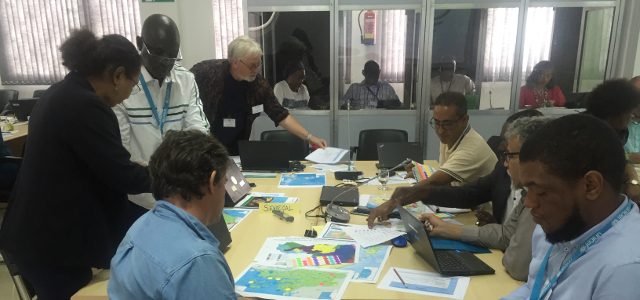Global Water Partnership (GWP) and The United Nations Children's Fund (UNICEF) held the West and Central African Region (WCAR) WASH Climate Risk Assessment workshop on 25 September 2017 within the premises of the UNICEF WCAR Office in Dakar. This initiative is part the ongoing joint global collaboration established in 2014 between UNICEF Headquarters (Water Team) and GWP Headquarters (Global Climate Team), and supported by UNICEF WCAR Office, GWP Africa Office, UNICEF US Fund and the Climate Unit of UNICEF’s HQ Division of Research and Policy.
Under their joint global collaboration, UNICEF HQ and GWP developed a Strategic Framework for WASH Climate Resilient Development that covers four areas of work: 1) understanding the problem; 2) appraising options; 3) delivering solutions; 4) monitoring and moving forward. GWP and UNICEF developed, in addition to the strategic framework, knowledge products including: (i) the Guidance Note - Risk assessments for WASH; (ii) the Technical Brief: Appraising and prioritising options for climate resilient WASH and (iii) a series of learning modules and a capacity building workshop package.
The regional workshop was attended by around 40 Participants from UNICEF country offices, UNICEF WCAR Office, UNICEF headquarters, representatives from the 24 WCAR countries (Benin, Burkina Faso, Cabo Verde, Cote d'Ivoire, Gambia, Ghana, Guinea, Guinea Bissau, Liberia, Mali, Mauritania, Niger, Nigeria, Senegal, Sierra Leonne, Togo, Cameroon, Central African Republic, Chad, Democratic Republic of Congo, Gabon, Guinea Equatorial, Sao Tome et Principe, Republic of Congo), GWP, ECCAS and partners. During the regional workshop, participants:
• Were introduced to the Strategic Framework for WASH Climate Resilient Development and its potential for use at national, subnational and local levels; as well as to the Global Framework for Climate Services and how to link knowledge to Climate Resilient WASH Informed Programming;
• Mapped the main climate-related risks to WASH and held discussions between countries grouped per basin, using as a basis the maps of their countries, their knowledge of the local contexts as well as the risk pre-assessments carried out using the methodology described in the Guidance Note Risk assessments for WASH;
• Learned about the positive experiences of climate resilient WASH development from Guinea, Chad, Ghana and Cameroon as well as examples of UNICEF supported ongoing initiatives;
• Understood the funding opportunities in the context of the global climate funds landscape, and opportunities for UNICEF;
• Built a roadmap for action per country, taking into account the country landscape in terms of ongoing activities, existing climate-related risks to WASH, funding opportunities and required supports from key partners and initiatives.
Based on the developed indicative roadmap for each country, UNICEF and GWP collaborating with other partners will go on to convene the entire WASH sector in WCAR respective countries to carry national risk assessments and appraise options for climate resilience programming.
